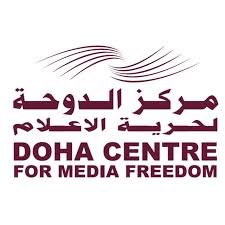On 26 April 2019, Qatar co-hosted a party in Washington DC to “celebrate the importance of media freedom and integrity,” despite its own lack of such freedoms. Jassim Bin Mansour al-Thani, a media attaché for the Qatari embassy, commented that “Qatar treats media in Qatar and around the world with respect” and “believes firmly in a strong, fair, and independent press.” This party took place only ten days after the Qatari government shut down the Doha Centre for Media Freedom. Al-Thani claimed that, while the Doha Centre is closed, Qatar will continue to “invest heavily in initiatives to protect journalists and promote media freedom,” and legislation to protect media from censorship is “in its final stages.”
Qatari authorities arbitrarily closed the Doha Centre for Media Freedom – a non-profit organization intended to work for press freedom and quality journalism in Qatar, the Middle East, and the world – on 16 April 2019. The Doha Centre offered several programs such as emergency assistance for journalist, as well as training. The Centre established in 2008 by Sheikh Hamad bin Khalifa Al Thani, the Emir of Qatar, and the arbitrary closure of the Doha Centre raises concerns about freedom of expression in Qatar.
The Doha Centre was seen a beacon of hope in a region plagued by the onslaught of public freedoms as well as the killing of several journalists, but faced its own set of issues. The Doha Centre received full funding from the Qatari government, which therefore resulted in restrictions on its professional coverage of human rights against journalists and violations occurring in Qatar and other Gulf countries. All published media was carefully watched, and corresponded to the direction of the higher authorities. Due to large oversight, the government turned the Doha Centre into a tool for state-led propaganda rather than a defender of rights, including freedom of expression.
Over the past couple of years, the Doha Centre has faced internal conflicts concerning the lack of freedom to write about domestic issues. In 2009, Qatari officials sought to stop the Centre’s head of research, Hajar Smouni, from traveling to Bahrain for talks with Sheikh Mai AlKhalifa about reforming press laws. The Centre’s former director, Robert Menard, criticized restrictions on Smouni as “unacceptable.” Smouni’s travel ban was eventually lifted, but not in time for her to make it to the meeting. Furthermore, criticism of the Qatari ruling family was not allowed. Menard stressed that Qatari officials “never wanted an independent centre, one that was free to express its views without being limited by political or diplomatic considerations, one that was free to criticise Qatar itself.” The credibility of the paper was questioned since journalists were never able to comment on the problems in the country that it was based out of.
According to the 2018 report by Freedom House , Qatar’s press freedom status is described as not being free. Print and broadcast media are heavily influenced by leading families and are subject to state-censorship. Journalists practice self-censorship and can face possible jail sentences for defamation. Doha News, an English-language website, has been blocked in Qatar for not having the required operating permits and also for being known to report on issues in the region that are not favorable to the government.
Although Qatar’s constitution guarantees the right to expression and opinion, several laws have been put in place to restrict this right. The provision of the Penal Code and the 2014 cybercrime law criminalize the spreading of “false news” on the internet and provides for a maximum of three years in jail for anyone who posts online content that “violates social values or principles.” The penal code calls for a maximum of five years in prison for criticizing the emir. Qatari authorities used this law to to detain a journalist from Doha News after writing an article about a man convicted of a serious criminal offence in 2015.Additionally, in 2013, Mohamed at-Ajami, a poet, was sentenced to 15 years in prison on the basis of his poetry criticizing the Qatari ruling family and other Arab rulers. He has since been pardoned and released. A Qatari attorney described the penal code and the cyber crime law as “like a knife held close to the necks of writers, activists and journalists.”
Qatar’s involvement in a party supporting free press is incredibly ironic considering its ongoing suppression of free expression and censorship of the media. The arbitrary closure of the Doha Centre comes as no surprise with Qatar’s history of restrictive press. The Doha Centre, once viewed as a beacon of hope, is just another victim to the repressive censorship system put in place by Qatar.
Tia Jackson is an advocacy intern with ADHRB





